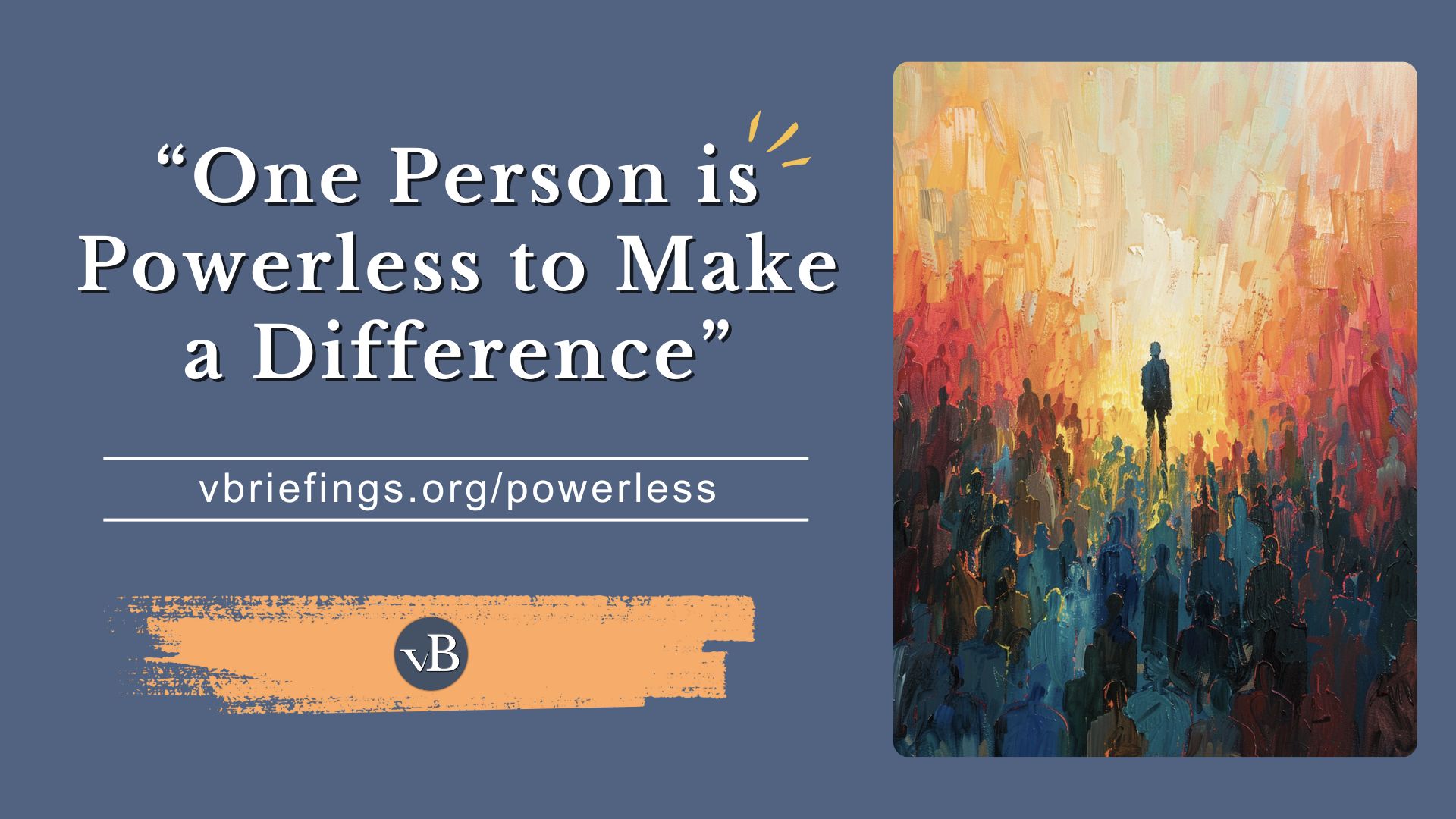Preface
Briefing description and more.
This briefing explains, with six key points, why one person can make a difference.
Companion Videos
How to use companion videos
Videos may be posted on multiple social media platforms, and you can share them on each platform according each platform’s conventions.
Share this Briefing
Social Media Sharing Image
This image will be used when sharing the briefing on a social media platform. You can see all social sharing images in the grid view.

How to share this briefing
Click on the icon for the platform on which you wish to share. What happens next depends on the platform, but generally a popup will appear, letting you add your own text as you share.
Briefing Meta
Metrics
Note: we will publish additional briefings after completing flashcards and presentation slides for selected briefings.
Counts:
| Main Text | |
| Key Points | 7 |
| Counterclaims | 2 |
| Supplementary | 1 |
| Further Study | 1 |
| Footnotes | 5 |
| Media & Advocacy | |
| Advocacy Notes | 9 |
| —Socratic Questions | 12 |
| Flashcards | 25 |
| Presentation Slides | 0 |
| Memes & Infographics | 0 |
| Companion Videos | 0 |
Other Meta:
Date Posted:
Last Edited:
Edit Log:
Key Points Links
Loading…
Help Us Improve
Please send your suggestions for improvements, or report any issues with this briefing to team@vbriefings.org
We appreciate that you are taking the time to help up improve. All suggestions and reports will be carefully considered.
Summary
A concise summary of the briefing (see below for citations).
Individual actions can significantly reduce animal suffering. For example, a person who chooses veganism spares over 25 land animals and even more aquatic animals each year while driving demand for plant-based alternatives. Beyond saving animals, veganism can improve health, reduce environmental harm, and support a more equitable food system. By living ethically, individuals can influence others and demonstrate how personal choices lead to meaningful societal change.
Context
Places this topic in its larger context.
The commodification of animals is so pervasive that it is easy to feel powerless. However, you are already making a difference, for better or worse, and you can make a difference for the better.
Consider this: if you have adopted this objection to veganism and animal rights, it would seem that you have implicitly and subtly acknowledged that there is a difference to be made.
Key Points
This section provides talking points.
You are already making a difference, for better or worse.
Buying products made from animals makes a difference, but not a positive one. It contributes to suffering because it involves paying others to breed, abuse, and slaughter animals. It also helps ensure the suffering will continue by reinforcing the belief that it’s OK to do so.
Everyone makes a difference. The question is not, “Can you make a difference?”; the question is, “What kind of difference will you make?”
The laws of supply and demand virtually ensure you will save lives and spare suffering by going vegan.
While animals already in the production system cannot be saved, going vegan reduces future suffering by preventing more animals from being bred, abused, and slaughtered. This shift occurs because of supply and demand: buying animal products drives the market to produce more, and reducing consumption signals the market to produce fewer animal products and more alternatives. Choosing not to buy animal products impacts the demand, leading to fewer animals being exploited.
How many lives will you save and spare suffering by going vegan?
- An analysis by the National Resources Defense Council (NRDC) determined each person in the United States eats 26 land animals per year.1
- Using data from the USDA and the Census Bureau, Counting Animals calculates vegetarians save, on average, over 400 animals per year—34 land animals and 370 sea animals. They acknowledge that vegans save even more. 2
- Other estimates are higher. Of course, exactly how many animals you personally save will depend on your patterns of consumption before you become vegan.
Imagine that every year, you rescue 26 dogs, cats, or wild animals. The public would lavish you with praise as a champion for the animals, and you would justifiably feel better about yourself for it. Yet the animals we exploit and slaughter for food and other uses are no less deserving of their lives than wild animals or the pets we adore and protect. They are the same in all the ways that matter morally.
It’s a matter of principle.
Even if you were the only person refusing to participate in a particular form of mass suffering for humans or other animals, and that lack of participation resulted in no discernible benefits for the victims, you should still consider not participating as a matter of principle.
Setting a powerful example will influence others.
When you set a powerful example, you will likely have more influence on others than you realize. When you go vegan, a ripple effect begins. Over time, some of your friends, family, and acquaintances, having observed you, will go vegan or at least begin reducing their demand for animal products.
That will influence others to do the same, which will, in turn, influence even more to do the same.
If everyone believed one person could not make a difference, there would be no progress.
Imagine if Martin Luther King Jr. or Mahatma Gandhi believed they and their fellow activists could not make a difference.
Margaret Mead is credited with saying, “Never doubt that a small group of thoughtful, committed citizens can change the world: indeed, it’s the only thing that ever has.”3
The difference you make goes beyond reducing the suffering of animals.
The science is clear that going vegan will reduce your risk of chronic disease, diminish your footprint on the planet, and promote a more efficient food system better capable of feeding the world’s starving, hungry, and impoverished.4
The claim of being powerless could be, at its core, merely an excuse.
Consider whether you are subconsciously making an excuse because you are unwilling to change your behavior.
Counterclaims
Responses to some yes but retorts.
Claim: One person can’t impact demand because billions are slaughtered every year.
Some might say that in a large market, the action of one individual could not possibly impact demand because it is such a small percentage of total demand.
This may or may not be true for one person, but the fact that millions are not buying products made from animals5 does reduce demand—and, consequently, supply. Any one of the millions not buying such products accounts for a portion of that reduction in demand.
Claim: One shouldn’t be given credit for saving lives when they stop eating animals.
One could argue that you are not saving any lives, because you should not have been complicit in the slaughters in the first place. If you would have otherwise contributed to the slaughter of an animal and then decided not to, you shouldn’t be credited with saving a life.
Point taken, but when the societal norm is paying others to slaughter animals, one could argue that it’s not entirely disingenuous to think of it as saving animals.
Supplementary Info
Additional information that may prove useful.
An inspiring starfish story…
Once upon a time, there was an old man who used to go to the ocean to do his writing. He had a habit of walking on the beach every morning before he began his work. Early one morning, he was walking along the shore after a big storm had passed and found the vast beach littered with starfish as far as the eye could see, stretching in both directions.
Off in the distance, the old man noticed a small boy approaching. As the boy walked, he paused every so often, and as he grew closer, the man could see that he was occasionally bending down to pick up an object and throw it into the sea. The boy came closer still, and the man called out, “Good morning! May I ask what it is that you are doing?”
The young boy paused, looked up, and replied, “Throwing starfish into the ocean. The tide has washed them up onto the beach, and they can’t return to the sea by themselves.” The youth replied, “When the sun gets high, they will die unless I throw them back into the water.”
The old man replied, “But there must be tens of thousands of starfish on this beach. I’m afraid you won’t really be able to make much of a difference.”
The boy bent down, picked up yet another starfish, and threw it into the ocean as far as he could. Then he turned, smiled, and said, “It made a difference to that one!”
Adapted from The Star Thrower, by Loren Eiseley (1907–1977)
Further Study
Sources providing a deeper understanding of the topic or related topics.
Other Resources
This video by Colleen Patrick-Goudreau sheds light on the topic:
Advocacy Resources
Information to help with outreach and advocacy.
Note: we will publish additional briefings after completing flashcards and presentation slides for selected briefings.
Share This Briefing
Cloned from the Preface Section on page load.
Companion Videos
Cloned from the Preface Section on page load.
Memes and Infographics
No images found.
How to use Memes and Infographics
To sequence through all memes and infographics on this page, click on any image than use the arrow keys or the arrow buttons to show next and previous images.
To share a meme or infographic, right click on the image and choose download or save as. Then upload the image to the platform of choice.
Presentation Slides
Slides not available.
How to Use the Presentation Slides
You can view the slideshow full screen by clicking on the first link above.
To use Canva presenter mode, view the speaker notes, or download the slides as PowerPoint, login to Canva (the free account works) and follow the Full Canva Link provided above.
To copy this presentation to your own Canva project, use the Full Canva Link provided above, then select File->Make a Copy from the upper left. You can build your own unique presentation from multiple briefings by copying the presentation from each briefing and then building another presentation from the copied presentations.
Flash Cards
We partner with Brainscape because of their excellent features for learning. You will need to create a free Brainscape account to study the cards.
Go to Flash Cards: This will take you to a list of decks.
About Flash Cards and Brainscape
Flash cards are here to help you commit important facts and concepts in this briefing to memory.
In Brainscape, there is one deck for each briefing. You can study more than one deck at a time. Brainscape uses spaced repetition to promote memory retention. It is “the secret to learning more while studying less.”
You can study using your browser, but Brainscape also has a free mobile app that makes learning anywhere easy.
Socratic Questions
Socratic-style questions are embedded in the Advocacy Notes below, and shown in italics.
These are open-ended, thought-provoking questions designed to encourage critical thinking, self-reflection, and deeper understanding. They are inspired by the Socratic method, a teaching technique attributed to the ancient Greek philosopher Socrates, who would ask his students probing questions rather than directly providing answers.
The goal is to help people examine their beliefs, clarify their thoughts, uncover assumptions, and explore the evidence and reasoning behind their ideas.
Advocacy Notes
Tips for Advocacy and Outreach
General Tips
Your goal when discussing this objection to veganism is to challenge this sense of powerlessness and show that individual choices do create meaningful impact.
Realize that if someone asserts changing their behavior will not make a difference, they may be implicitly admitting that their behavior is ethically problematic. Otherwise, they would have just said, “It’s not wrong.” It might be helpful to point this out.
You can also point out that they are saying, in effect, that if most people commit a wrong, it’s ok for me to commit a wrong. If they assert that’s not the case, then ask them to explain why that’s not the case.
Segue the Conversation Back to Animal Ethics
Ask a question that can lead the conversation back to animal ethics.
- “Are you fully aware of the kinds of suffering animals are forced to endure because we choose to make a difference for the worse? Let me explain…“
Explain How Supply and Demand Weigh In
Many people assume that their choices are too small to affect the system, but markets respond to consumer demand.
- “When fewer people buy animal products, the industry responds by producing less. That means fewer animals bred into suffering. This isn’t speculation—it’s basic economics.”
- “Studies estimate that a vegan saves dozens of land animals and hundreds of aquatic animals every year. If that’s just one person, imagine what happens when thousands make the same choice.”
Show Them That They’re Already Making a Difference—For Better or Worse
Most people don’t realize that they are already making a difference, whether they intend to or not. The real question is what kind of impact they want to have.
- “Every time we buy animal products, we make a choice that contributes to suffering and death. That choice keeps demand for those products high and ensures the cycle continues. So, the question isn’t whether you make a difference—it’s whether your difference helps or harms.”
- “If you think one person’s actions don’t matter, ask yourself—what if nobody made ethical choices? Would progress ever happen?”
Why? This shifts their perspective from feeling powerless to recognizing that their actions already have consequences.
Make It Personal
- If you were an animal facing a life of suffering followed by slaughter, would you want someone to believe their choices didn’t matter, or would you want them to choose kindness?”
- “If you rescued 26 dogs from being killed every year, people would call you a hero. So why not see yourself the same way when you spare 26 land animals and hundreds of sea animals by choosing veganism?”
Remind Them of Their Values
- —“Even if your actions didn’t immediately change the world, wouldn’t you still want to live according to your values?”
- —“If you knew an injustice was happening, would you participate in it just because others are?”
Why? This shifts the focus from outcomes to integrity—removing participation from cruelty is valuable regardless of how many others do the same.
Show the Power of Influence
By going vegan, they set an example for friends, family, and even strangers.
- “When you go vegan, others notice. Over time, your choices inspire family members, coworkers, and friends. And when they start changing, they influence others, too. That’s how every movement for justice has ever grown.”
- “If you knew that your actions could inspire others to change, what kind of example would you want to set?”
- “Think about how people like Martin Luther King Jr. and Mahatma Gandhi created massive change. If they had believed one person couldn’t make a difference, where would we be?”
Why? This helps them see that change happens gradually, one person at a time.
Footnotes
Our sources, with links back to where they are used.
- Susan Cosier. How Much Meat We Eat.” NRDC. Accessed December 29, 2018. ↩︎
- Harish. “How Many Animals Does a Vegetarian Save?” Accessed December 29, 2018. ↩︎
- Never Doubt That a Small Group of Thoughtful, Committed Citizens Can Change the World; Indeed, It’s the Only Thing That Ever Has – Quote Investigator.” Accessed December 29, 2018. https://quoteinvestigator.com/2017/11/12/change-world ↩︎
- Our introduction to veganism and briefing on hunger provide citations for these assertions. ↩︎
- “Vegan Statistics: Why The Global Rise in Plant-Based Eating Isn’t A Fad.” Food Revolution Network (blog), January 18, 2018 ↩︎




